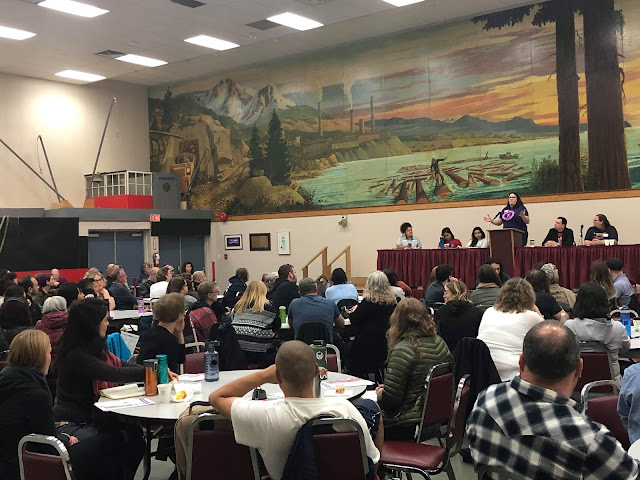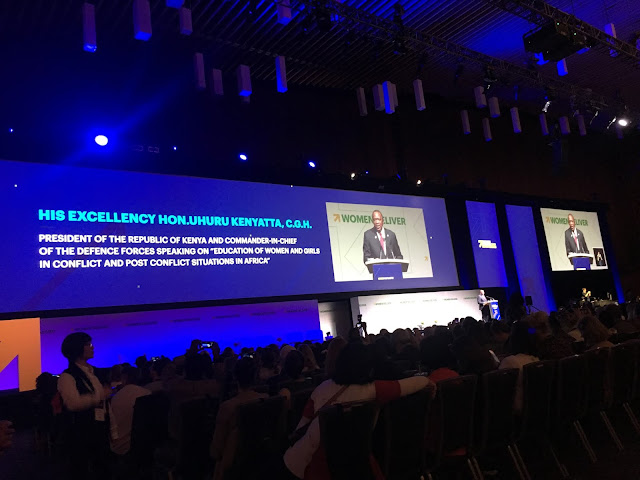Women Deliver: Making Commitments Reality - Rights of Migrant and Refugee Women
This session featured:
- Joan Timoney - Women's Refugee Commission (USA) - moderator
- Lina Abou-Habib - Women's Learning Partnership (Lebanon)
- Melanie Gallant - UN High Commissioner for Refugees (Canada)
- Zoreh Yasna Faizi - Women Refugee Route (Denmark)
Our panelists were very different. We started with Zoreh Yasna Faizi is an Afghan refugee who settled in Denmark. She was born during the war in Afghanistan. Her father was a strong feminist and a politician of which she wanted to be as well. When she was 8 years old her school closed when the Taliban came to power. They had to leave Afghanistan, headed to Iran for a new life. In Iran, as refugees they had no rights. She could not go to school and would cry everyday watching Iranian children from her window go to school. That experience forced her to grow up quickly and ingrained in her brain that she always had to prove that she was good enough. They decided to leave Iran and settled in Denmark, where she could finally go to school!
As I was listening to her story, I was reminded of the work I did in my third and fourth years of university. On September 11, 2001, the world changed. I was studying international relations (and literature) and while our hearts broke for the victims of the terrorist attacks in the US (we all had friends and family who lived in New York or DC at the time). At the time, there were a lot of headlines and news stories about how the Taliban banned women and girls from going to school. One of my professors in the poli sci department asked a few of us to meet after class one day. She had the idea to start an organization to build awareness on campus about the situation for girls in Afghanistan. So in partnership with the Global Students Outreach Association (GOSA) - a student club that focused on health initiatives we founded the Afghan Women and Children's Education Project (AWCEP). We held fundraisers and lecture nights. We reached out to folks like Sally Armstrong from the University of Toronto who then put us in touch with Dr. Sima Samar who was running underground schools for girls in Afghanistan. It was interesting work and was a way for me to be involved in social justice work beyond school projects. Anyway, back to the session at WD.
Zoreh's love of school took through high school, university and then to law school. She got good grades and participated in internships but found that her name would exclude her from opportunities for jobs. Once a refugee you remain one forever - refugees are often associated with crime (just look at the rhetoric coming from the United States these days). She had to create her own opportunity to help women and girl refugees in Europe through an organization called Women Refugee Route where they help with advocacy and education on rights of refugees in relation to their legal status in European host countries. They ensure these women and girls have access to the right and relevant information.
Lina Abou-Habib is a Lebanese powerhouse. The context of her experience is rooted in the fact that 30% of Lebanon are refugees due to global conflict and the forced migration of many.There is tension in her country between humanitarian organizations who "don't do gender" and feminist organization who "don't do humanitarian." Conflict exacerbates gender inequality.
In Lebanon there is an absence of legal recourse or protection for women refugees.
- Obscene lack of learning from the aid community to mitigate and prevent
- recurrent trends are not stopping
- multi-layers of discrimination
- no legal recourse
For example - the civil war in Lebanon - internal displacement of people, and people still have not been returned. Despite the atrocities, there are opportunities for leadership and growth because no one wants to go back.
Then she goes on to talk about nationality rights - an area that is new to me. There is blatant gender discrimination in 50 countries. So that means that women cannot pass down their nationalities but men can. In the Arab world, women are subordinate to men as subjects of their families which can determine who they consider citizens. She said that this is not an issue of national security, but an issue of patriarchy. Whoa. The National Commission in Lebanon made a law regarding animosity towards refugees and there is no mention of neighbouring countries.
Melanie Gallant, speaks to access and the right to asylum in the first place. The barriers face are:
- Access to information and understanding that information so that women understand the protections afforded to them ensuring that information is understandable, useful and accessible - in format, language and compassion
- safe space to mitigate danger (Venezuela and Mexico)
- Access to legal aid - international law is not made for women. Refugees' gender makes no mention in the definition of the convention.
Women are still persecuted just because of their sex.
In regards to the Global Compact on Refugees - it's rare to see so many countries come together. In an upcoming global forum to discuss refugees, states will hold each other to account (although it's not binding), to pledge money, share best practices and technical assistance. She said that Canada played a leadership role to make sure women and girls were at the heart of the forum. There's a lot of buzz and excitement around this and Canada is excited to participate.
After their presentations we went into Q & A. They talked about queer folks, youth and the right to exist. One of the women in the room is a Palestinian refugee living in Lebanon who went into the extreme difficulties Palestinian people face in any host country because legally, they and their state do not exist. I was reminded of the CUPE paper "The Wall Must Fall" and will revisit it at some point.
Many moons ago, when I taught ESL, I had a class full of refugees. I remember the heart and humour, the eagerness to contribute to Canadian society and their willingness to learn enough English to start looking for work. I taught a low literacy class where most people were from Afghanistan, Syria, East Timor, and Ukraine. We covered basic things like how to create your signature, how to use a bank, how to get a library card, those kinds of things. I remember some of the harrowing stories of how they escaped to come to Canada but I never thought of how complicated the legal systems in the world can be. I learned a lot from this session.




Comments
Post a Comment